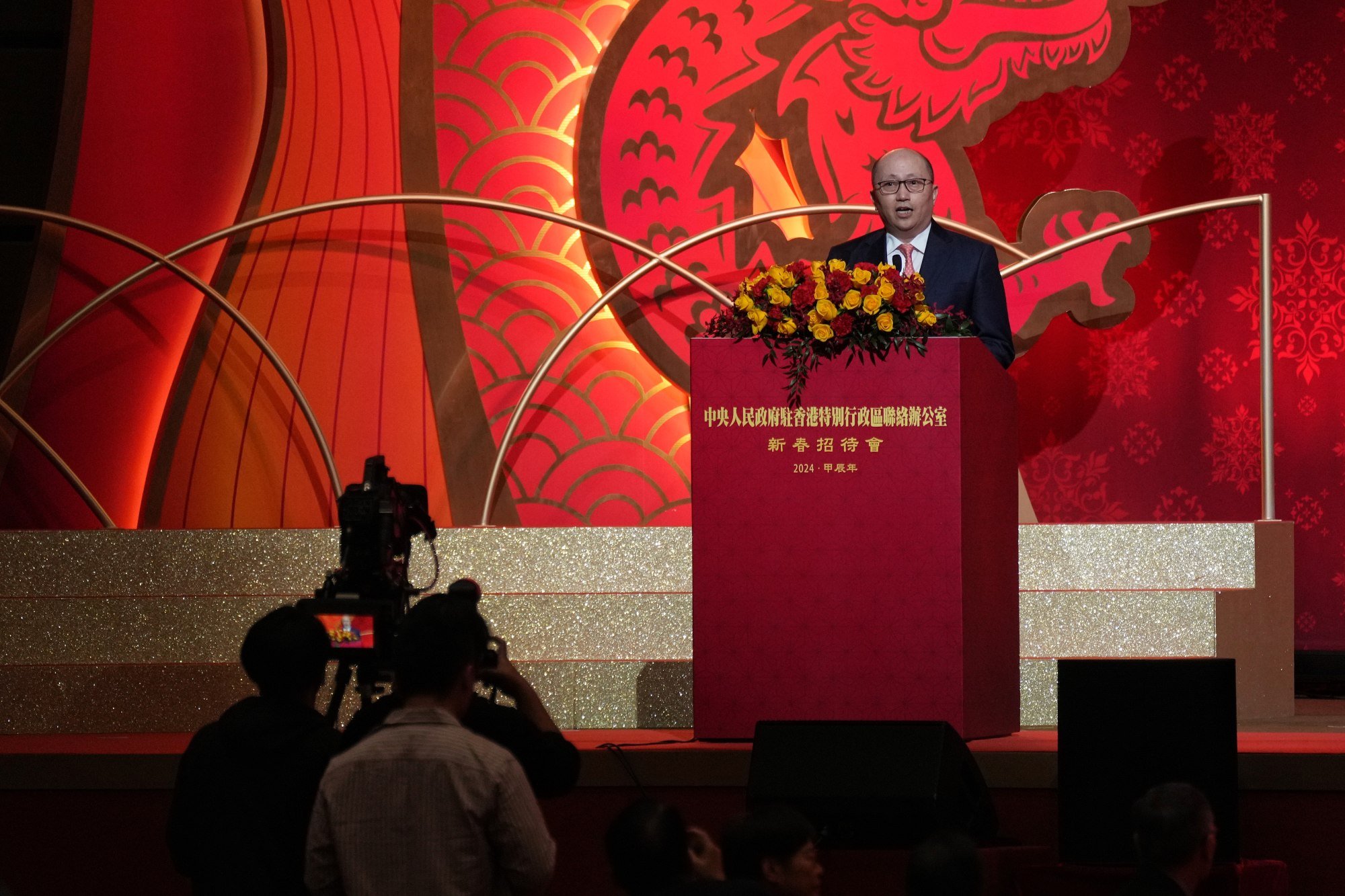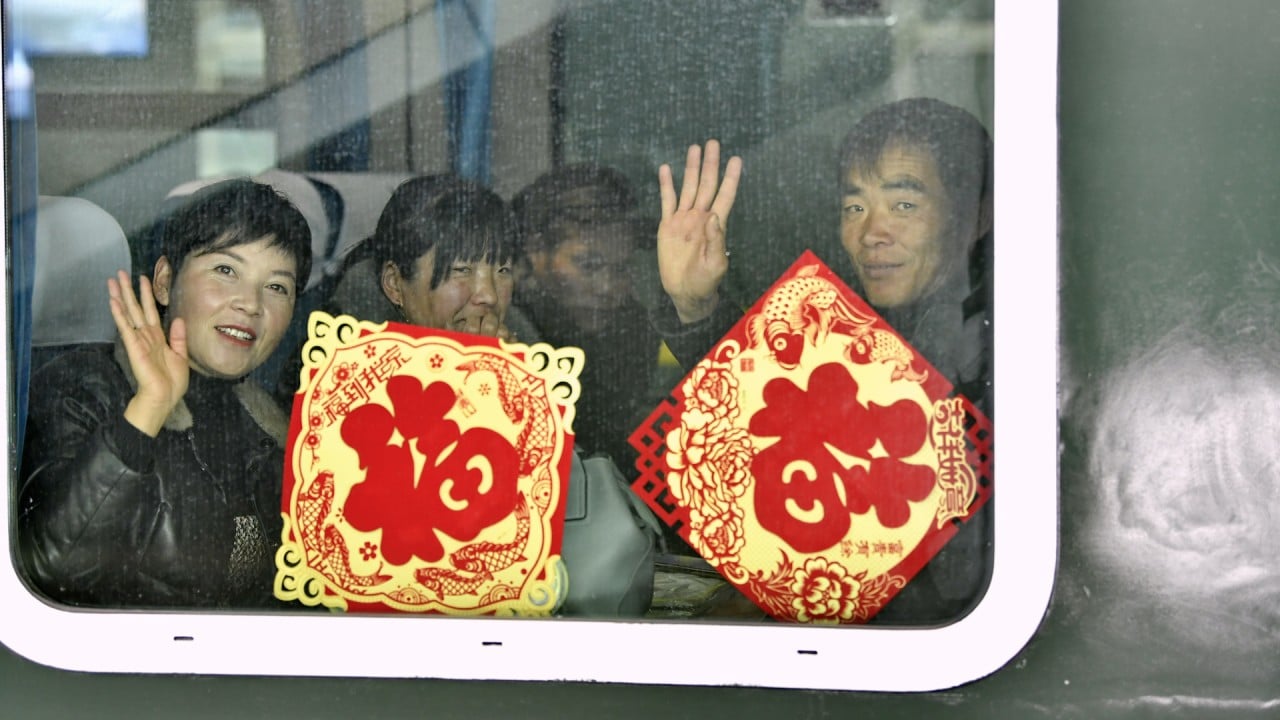
Development, national security ‘two wheels of a cart’, Beijing’s top official in Hong Kong says, calling Article 23 legislation next step for city
- Zheng Yanxiong, director of the central government’s liaison office in Hong Kong, lists three wishes for the city at Lunar New Year reception
- Authorities earlier in the day launched a public consultation on enacting Article 23 legislation
Zheng Yanxiong, director of the central government’s liaison office in the city, listed three wishes for Hong Kong on Tuesday evening after local authorities earlier in the day launched a public consultation on enacting Article 23 legislation.
Article 23 of the Basic Law, Hong Kong’s mini-constitution, requires the city to enact legislation to ban acts of treason, secession, subversion and theft of state secrets, among others.
Zheng told his office’s Lunar New Year reception that enactment of Article 23 was a manifestation of the traditional Chinese pursuit of territorial integrity and national safety.

“The implementation of the national security law and the principle of ‘patriots ruling Hong Kong’ has brought Hong Kong security and prosperity, and demonstrated such pursuits,” Zheng said, referring to the legislation Beijing imposed on the city in 2020 following anti-government protests the previous year.
He described national development and security as “two wheels of a cart” and “two wings of a bird”. Zheng said security was a prerequisite for peace and economic prosperity and pointed to the importance of completing the Article 23 legislation.
“The next step is to settle important national security cases and complete the legislation of Article 23 of the Basic Law.”
How Hong Kong plans to amend laws, create new offences for Article 23 legislation
Zheng wished that Hong Kong could uphold the “one country, two systems” principle and the rule of law, becoming a vibrant and diverse city providing abundant opportunities, “letting entrepreneurs pursue their dreams, workers find their jobs, investors see their returns”.
He said 2023 was an unusual and challenging year for Hong Kong, but it had made remarkable achievements, including the reopening of the border with mainland China and the success of the district council election. He also pointed to the historic success of the city athletes in the Hangzhou Asian Games.
“We bid farewell to the declining economy and welcome prosperity,” he said.
“Hong Kong has entered a new chapter with good prospects and said goodbye to the times of uncertainties and chaos.”
Looking ahead to the Year of the Dragon, Zheng said he had a wish that Hong Kong could ride the winds of change in the world by aligning itself with the national development agenda and engaging in extensive international cooperation.
“With our concerted efforts, we should pursue quality developments over quantity ones, continuously strengthen Hong Kong’s position as an international financial, trade and shipping centre, and ultimately turn the uncertainties into opportunities, benefiting everyone in the city.”
He also said he had a wish that the city would vigorously promote patriotism and pass down traditional Chinese values, as well as go further in developing into an international tech and cultural exchange hub to revive the charm of local films, pop music and martial arts novels in the old days.
He said cultural power was key to social cohesion and harmony, and the city should not only promote horse racing, dancing and stock investments – a reference to a famous quote by late paramount leader Deng Xiaoping – but also create more enjoyment and surprises for the public.
“We need to come up with more creative and entertaining offerings to light up the city’s cultural scene,” he added.
Breadth, penalties of Hong Kong’s domestic national security law under scrutiny
Lau Siu-kai, a consultant at semi-official Beijing think tank the Chinese Association of Hong Kong and Macau Studies, said the central authorities had called on people to “get together and work hard to improve Hong Kong’s economic competitiveness” through the speech.
“We are facing a lot of severe challenges, be it suppression from the West and the poor global economy,” he said.
“The central government was optimistic when discussing Hong Kong’s problems in the past, but this time they showed a stronger sense of concern and anxiety.”
Political commentator Sonny Lo Shiu-hing said an important purpose of the speech was to mobilise public support for the enactment of Article 23.
Lo said he believed the third wish, which focused on fostering mutual values and culture, also implied the expectation of strengthening soft power through cultural tourism and relevant infrastructure, including museums.
Chief Executive John Lee Ka-chiu, meanwhile, pledged at the same reception to finish enactment of Article 23 as soon as possible.
Lee said at the reception that Hong Kong society had formed a “strong consensus” on the legislation, following the painful experience of the “colour revolution” and “black violence” in 2019.
“We will complete the legislation as soon as possible to address the ‘shortcomings’ in safeguarding national security, allowing Hong Kong to move forward unburdened and to focus on economic growth, development, and people’s livelihoods.”
He said the other two key focuses for the year were accelerating economic development, including hosting mega events and joining the Regional Comprehensive Economic Partnership, the world’s largest free-trade bloc, and improving people’s quality of living.


